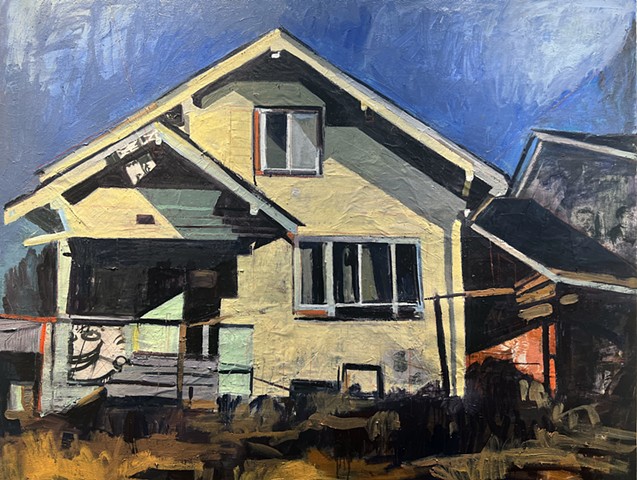Facades
I have always been captivated by unconventional beauty, but my subject matter in the last several years in particular has continued to serve as a subtle commentary on the ever-changing landscape of Seattle – for better or for worse. Many of the boarded-up buildings and houses I've captured have since been demolished and replaced by sleek, multi-use facilities and condominiums, all in the pursuit of urban density. This transformation raises questions about whether what is being lost surpasses what is being built.
Like many, I find myself overwhelmed by a deep sense of nostalgia for these places and images. They resemble postcards, but not the picturesque scenes you might expect. Their colors draw the viewer in, only for closer inspection to reveal surprises, disappointments, or even moments of recognition.
I am deeply intrigued by the unique qualities that a shelter can possess, and I wonder how a structure's meaning and purpose evolve when its original intent becomes obsolete. What lingers in their spaces? What secret memories, both joyous and sorrowful, do they safeguard within their walls? Inhabited spaces carry the essence of "home." Gaston Bachelard, in "The Poetics of Space," describes a house as an "imagined vertical being," one that rises upward and differentiates itself through its verticality. It speaks to our awareness of centrality.
But what about the uninhabited spaces? Do they bear the essence of the absence of presence or the presence of absence? These once-occupied homes, now vacant and forlorn, can only offer illusions of stability. They are waiting in a space of neither here nor there. I began contemplating the difficulty of waiting – simply waiting. To endure change is to reside in a profoundly uncomfortable space. To confront change over which one has no control, with no specified end in sight, presents an extraordinary challenge. In these paintings is an awareness of what it means to wait, to confront change, and perhaps even a tangible sense of hope for what changes may bring once the waiting is over.
Regarding my artistic process, there has been a notable shift in how I initiate the paintings. In the past, my approach involved enlarging and generating Xeroxed copies of my photos, subsequently collaging them onto the canvas before applying layers of paint. However, in this particular body of work, I've exclusively utilized torn images from older photographs, constructing the armature or structural foundation of the composition from these fragmented pieces.
By adopting this new method, my intention is to evoke a profound sense of the passage of time, a controlled chaos, and a personal narrative embedded in the delicate balance of a fleeting moment. The torn fragments symbolize the fragility of memory and experience, suspended in a precarious state that teeters on the verge of collapse or implosion at any given instant.

